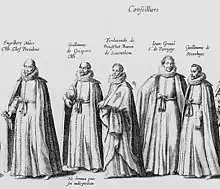Privy Council of the Habsburg Netherlands
The Privy Council or Secret Council (Dutch: Geheime Raad, French: Conseil Privé) was one of the three "collateral councils" (along with the Council of Finance and Council of State) that together formed the highest government institutions of the Habsburg Netherlands.[1] Based in Brussels, it was particularly charged with legal and administrative questions.[2]

Privy Councillors Engelbert Maes, Guillaume de Grysperre, Ferdinand de Boisschot, Jean Grivel and Guillaume de Steenhuys in the funeral cortege of Archduke Albert (1622)
History
The Council was founded on 1 October 1531 by Emperor Charles V.[3] He prescribed a president, eight councillors, and a secretary.
Philip V of Spain abolished the council in 1702, but it was later restored by the archduchess-governess Maria Christina, Duchess of Teschen and finally abolished by the Brabant Revolution.
Personnel
Presidents
- 1531-1540: Jean Carondelet.
- 1531-1540: Pieter Tayspil
- 1540-1548: Lodewijk van Schore
- 1549-1569: Viglius van Aytta
- 1569-1573: Charles de Tisnacq
- 1573-1575: Viglius van Aytta
- 1575-1583: Arnoud Sasbout
- 1587-1592: Willem van Pamele
- 1592-1595: Jan van der Burch
- 1597–1609: Jean Richardot
- 1614–1630: Engelbert Maes
- 1632–1653: Pieter Roose
- 1653–1671: Charles de Hovyne
- 1672–1684: Léon-Jean de Paepe
- 1684-1694: Pieter Frans Blondel
- 1694-1702: Albert de Coxie, baron of Moorsele.
- 1725-1732: Christophe-Ernest, 1st Count of Baillet
- 1733-1739: Jean Alphonse, 1st Count de Coloma
- 1739-1758: Gilles-Augustin de Steenhault
Councillors
Secretary
See also
References
- Paul F. State, Historical Dictionary of Brussels (2015), p. 393.
- Georges Martyn, "How 'Sovereign' were the Southern Netherlands under the Archdukes?", in The Twelve Years Truce (1609): Peace, Truce, War and Law in the Low Countries at the Turn of the 17th Century, edited by Randall Lesaffer (Leiden and Boston, 2014), p. 201.
- Geheime Raad (1531-1578), Huygens Institute for the History of the Netherlands. Accessed 3 April 2017.
This article is issued from Wikipedia. The text is licensed under Creative Commons - Attribution - Sharealike. Additional terms may apply for the media files.